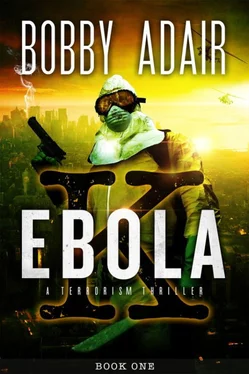Perhaps there was some secret ritual peculiar to these people that helped spread the disease with such comprehensive rapidity.
Or, it was airborne. In that case, a single carrier could infect a few or maybe a dozen, and those people would infect others, and the process would domino across the small farming community in no time. Ironically, the only thing that gave Dr. Littlefield hope was the chance that the disease wasn’t Ebola but some kind of particularly contagious flu. Kapchorwa lay in the tropics after all. Who knew how many nasty bugs lingered under the bushes and in the local monkeys’ blood?
And no one in the village had yet bled out and died.
With no deaths as of yet, Dr. Littlefield had to reconsider how he’d arrived at the conclusion that Kapchorwa’s little epidemic was Ebola. Was it just fear of the disease, due to the outbreak in West Africa that put the thought in his mind? Possibly. The symptoms were consistent with Ebola so far: raging headache, fever, nausea, diarrhea, red eyes, rash, unexplained bruising, but no external hemorrhaging—not yet. Had the roadblocks set up by an overreacting Ugandan government influenced his diagnosis? Possibly.
Perhaps his Ebola fears were just that—fears.
Dr. Littlefield told himself that he was not a fearful man, not a reactionary.
Movement down the street caught Dr. Littlefield’s eye. He looked up. His heart sank. A guy—that kid who was teaching the street children for the summer—was carrying someone else up the center of the deserted road. The day’s count of new infections was starting early.
In the hospital’s exam room, Austin looked out through the open door of the ward as the sun shown in through the east-facing windows. He lifted Rashid’s satellite phone and dialed Najid Almasi, Rashid’s older brother. On the third ring, someone answered.
“Hello?” said Austin.
A terse voice said something in Arabic.
“Hello? Do you speak English?” asked Austin.
The irritated voice said, “Who is this?”
“Austin Cooper. I’m a friend of Rashid.”
“You are American.”
“Yes.”
“Why are you calling me on Rashid’s telephone?”
“Is this Najid Almasi?”
“I’ll ask again. Why do you have this telephone?”
Austin was reluctant to divulge his information without knowing whether the person on the other end was Najid or not. But what choice did he have? “I don’t know how much you know about what Rashid is doing in Uganda, but I am his roommate. We work together with the street kids.”
A long pause followed before the voice said, “You are the one he talked about.”
“Yes. I’m Austin.”
The voice repeated, “Austin.”
“Yes. If you are not Rashid’s brother, Najid, I need to speak with him. Please, it’s important.”
“Has something happened to Rashid?”
“He’s sick.”
There was a silence that lasted for a long time. That was to be expected. Sick could have many meanings—many deadly ones—with Ebola on the loose.
“Can he talk?”
“Not right now. He’s not conscious.”
“What does that mean?”
“He had a fever when I found him this morning. He wouldn’t wake up.”
Another silence.
“You are in Kapchorwa?” asked Najid.
“Yes, in the hospital there.”
“I will be there in six hours.”
“What? How?”
“That is no concern of yours. It would be a great favor to me if you saw to my brother’s care until I arrive.”
“Um.” Six hours? Najid must have been on his way already. “Of course.”
“Dr. Littlefield thinks it might be typhoid.” Nurse Mary-Margaret led Austin into the exam room, then stopped in front of a wide stainless steel sink. “Wash. Use that soap and plenty of it. See that poster above the sink?”
Austin nodded at the poster. “You mean this one that tells me how to wash my hands?”
“Yes. Follow the directions exactly. Just because you’ve washed your hands a million times since you were little doesn’t mean you’ve ever done it correctly.”
“Yes, ma’am.” Austin asked, “If it’s typhoid, it would be in the water, right?”
“We have our own cistern. We only use well water as a last resort.”
Austin leaned over the sink and turned on the faucet.
Nurse Mary-Margaret pushed a thermometer into Austin’s mouth. “I know you think you feel good enough to help, but if your temperature is too high, you need to be in a cot.”
“A cot?” Austin tried to smile. They both knew there were no cots available, nor places to put them.
“A pallet on the floor, then. Keep your mouth shut, so I can get a temperature.”
Austin scrubbed his hands and arms up to his elbows, and then raised them to let them dry as he’d seen doctors do on TV.
Nurse Mary-Margaret hung a blue apron over his head and turned him around to tie it. “Let’s hope this is typhoid. Thieves stole most of our supplies the day after the outbreak started here.”
“You’re shitting me.”
“I’m not.” Nurse Mary-Margaret took the thermometer out of Austin’s mouth and looked at it with a frown. Without looking up, she asked, “And how do you feel?”
Austin figured it would be best not to mention the four aspirin he’d taken an hour earlier. “I’ll live.”
Nurse Mary-Margaret shook her head and directed her frown at him instead of the thermometer. “Those figures of speech are funny when you miss a day of school back in Detroit or wherever you’re from—”
“Denver.”
“—but they mean something real here. You should know that now.”
Austin accepted the scolding without comment. She was right. “I don’t feel good, but I feel good enough to help in the ward. If I get too sick, I’ll let you know and take a spot on the floor.”
She put a surgical mask to his face and hooked the elastic bands over his ears. “Don’t take this off. We don’t know for sure yet that you’re sick with what they’ve got, and if you are, we don’t want you infecting anyone who isn’t.”
“Yes, ma’am.”
She instructed him on the complex process of putting on surgical gloves. After that, Nurse Mary-Margaret put her hands on Austin’s shoulder and held him in front of her, demanding one hundred percent of his attention. “You need to understand, Austin, if this is Ebola, odds are—with what little protection we still have to put on—you’ll catch it and you’ll die. Most do.”
Austin nodded.
“I know you think you have whatever everybody else has, but you don’t know that. If you don’t, and you come in here to help with this inadequate protection, you’ll get what they’ve got.”
“But it could be typhoid.”
“Don’t do that. You know that hope is as thin as I know it is. Ebola is sixty to ninety percent deadly. You’re young and healthy, so that may increase your odds of survival, but if you walk into that ward, it may be the decision that costs you your life.”
“ You’re helping,” he replied.
Mary-Margaret huffed. “This has nothing to do with me. I’ve already had a good, long life. I have sons older than you. I have grandchildren.”
“If I go in, will I be helpful? Will it give some of those people a chance to live? Or will I be wasting my time?”
“You’ll be helpful. There aren’t enough of us to help these people already, and if more come today, we’ll be overwhelmed.”
“Is there any help on the way?” Austin asked.
She smiled weakly. “We sent word to Kampala, and we’re praying.”
“What about the short-wave radio?”
“The radio man is down with the disease. He can barely remember his own name.”
Читать дальше












